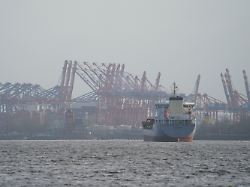Biggest plus since February 2022
Companies are selling more abroad again
January 8, 2024, 11:58 a.m
Listen to article
This audio version was artificially generated. More info | Send feedback
In November, exports rose faster than they have in more than a year and a half. This is mainly due to business with customers in the EU. But economists don’t yet see any relief.
German exporters are sending a sign of hope in the midst of the gloomy situation. Foreign business grew faster in November than in over a year and a half. Exports increased by 3.7 percent compared to the previous month to 131.2 billion euros, as the Federal Statistical Office announced. This is the biggest increase since February 2022. Economists had only expected an increase of 0.3 percent, after two consecutive declines in October with minus 0.4 percent and in September with minus 2.2 percent.
Imports grew again in November for the first time after five declines in a row, by 1.9 percent to 110.8 billion euros. “At least a ray of hope in the economic darkness,” said economist Oliver Niklasch from Landesbank Baden-Württemberg (LBBW).
This is also thanks to business with other EU member states. This increased by 5.4 percent to 71.5 billion euros in November. The USA remained the most important buyer of goods “Made in Germany”, although exports this time fell by 1.4 percent to 13.4 billion euros. Exports to China, on the other hand, increased by 3.1 percent to 8.1 billion euros.
Economists are still pessimistic for the following year
The export-dependent industry is suffering from the poor global economy. Many central banks have raised their key interest rates sharply due to high inflation, which makes loans for investments in German export hits such as machinery, systems or vehicles significantly more expensive and thus dampens demand.
“Adjusted for the currently highly fluctuating large orders, incoming orders have fallen for three months in a row. Companies can no longer absorb the weaker demand because their order backlogs are now too low after processing the orders that were left on hold during the corona pandemic “This also suggests a further decline in industrial production as does the IFO business climate, which is in recession territory. We continue to expect the German economy to decline by 0.3 percent in 2024,” said Jörg Krämer from Commerzbank.
High interest rates, but also “excessive bureaucracy” contributed to less money being invested in companies. “As a result of high inflation and increased interest rates, the construction industry in particular has been hit hard. This difficult environment will not change any time soon. Growth will also be disappointing in 2024,” said Thomas Gitzel from VP Bank .
“The strong increase in exports is a bang, but hardly a liberating blow. All in all, the external economic environment is weak. Because of the weak global economy, this remains the current trend. What is important is that price competitiveness is regained. Above all, this is also the case Politics required,” commented Alexander Krüger, chief economist at Auffhäuser Lamp Privatbank.
